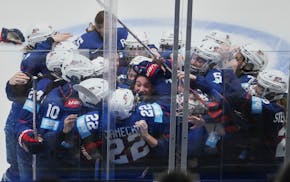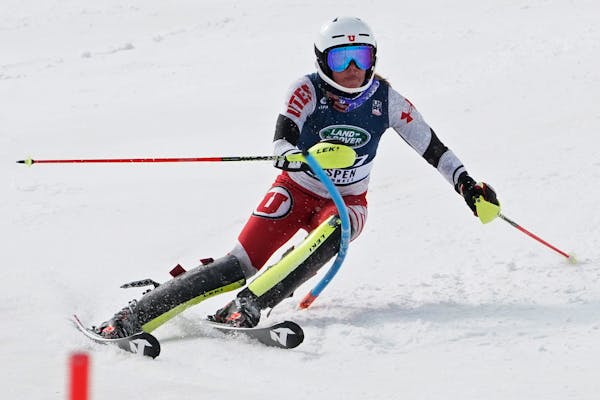The sprawling, powder-covered ski resort near the top of Killington Peak, deep in Vermont's Green Mountains, resembles tiny Buck Hill, a couple dozen yards from a freeway in a Minneapolis suburb, in the same way that Yosemite and Fenway are both parks. Yet as she stood atop a Killington starting gate on a gloomy November Sunday in 2018, Paula Moltzan summoned the spirit, and the expertise, gained at that curious, bare-sloped training ground back home.
By doing so, she reignited a languishing international career — and skied the first few turns toward Beijing.
Moltzan, born and raised in Prior Lake and enjoying the best season of her World Cup career, will ski in the women's giant slalom on Monday and the slalom on Wednesday, at age 27 making her Olympics debut four or eight years later than she once dreamed. It's the seventh consecutive Winter Games that will include a Buck Hill beginner, someone who roared down that bumpy 260-foot knoll so often that mountain peaks and medal podiums eventually beckoned.
"It's very good place for kids living in the flatlands," said Erich Sailer, the legendary coach who decades ago turned Buck Hill into an Olympics on-ramp. "Paula was 10 when I watched her ski the first time, and I knew right away. I saw that she has talent like only one other that I coached at that time, and that was [three-time Olympian] Kristina Koznick. You can't keep someone like that down."
Yet if not for that day in Killington, when as a college junior she surprised even herself by finishing among the top skiers in the world, Moltzan can't say with any certainty that her career would have happened.
"I sometimes think about that. I think maybe, yeah, if I didn't have that breakthrough race, I wouldn't have been asked to come back to the U.S. ski team," Moltzan said last week, from an airport hotel in Zurich, Switzerland, as she prepared for the long flight to China. "Without the support of a national governing body, it's really difficult to make it in ski racing. So that day was a large turning point in my career. And my life."
More like a turning-around point, actually, since Moltzan, who first qualified for Team USA's junior divisions while in high school, had long been considered a potential Olympic contender — until she wasn't.
Starting in 2012, she worked her way up the national team's various levels, even winning a slalom gold at the junior world championships in 2015, the first American ever to do so. In 2016, she finally reached the "B" level, just below the World Cup regulars. But when that season ended, her coach called to deliver some news that felt catastrophic. Her so-so season hadn't reached the lofty standards that Team USA expected.
After five years, she was out.
"It hurt, no doubt. It's obviously very results-oriented, but you think about all the work you've put into it, so it's tough," Moltzan said. "You think, what now?"
Vermont bound
She didn't think about it for long. Within a week, she had been accepted as a scholarship athlete at the University of Vermont, with a two-pronged goal: Ski for the Catamounts, and study for medical school. There was a third benefit, too, that she hadn't even realized.
"College opened my eyes up to the fact that there's a lot more to life than just ski racing, and I take that as a huge blessing," Moltzan said.
She met Ryan Mooney, another Vermont skier who soon became her boyfriend — and since November 2020, her fiancé. "I met people, I focused on other things, I got perspective on what's important."
Catamounts coach Bill Reichelt noticed.
"The World Cup lifestyle is grueling for those kids, especially for young women who are kicking around Europe for months at a time and all they have is skiing, skiing, skiing. If things aren't going well, it's kind of tough to stay up emotionally and mentally. It's very competitive," Reichelt said. "Here, they can kind of clean the slate, clear their heads. It's a fun environment, it's very supportive."
Armed with that support and less pressure, Moltzan won the NCAA slalom championship as a freshman, and if not for an icy berm of snow that knocked her ski off in the final run, might have won the giant slalom, too.
"That was pretty cool. I had won some races, and I just felt more confident," Moltzan said. "It was probably one of my proudest moments, because it's not just a win for you. It's for the whole team, and the university, and all the fans. It made it very special."
It also rekindled her world-level ambition. The women's World Cup circuit has one race each year in the United States, at Killington, and Moltzan was invited to a qualification meet for the slalom race in 2017. She won it, but once the professionals arrived, she came out of her skis on the course in her first run and didn't finish.
Into the spotlight
A year later, she was invited to try out again, and once again qualified. This time, racing in front of a raucous "home" crowd less than 100 miles from campus, Moltzan finished 28th in her first run, entitling her, by finishing among the top 30, to a second run the following day. She realized any chance of a return to international racing might be at stake.
"When you want something so bad, I just think you can manifest it yourself," Moltzan said. "You can make it happen sometimes."
An overnight drizzle and higher temperatures softened the snow on championship morning, less than ideal conditions for skiers trained to race on well-groomed, steep courses. But for someone who trained at little Buck Hill?
"The conditions suited her that day," Reichelt said. "Shorter, less-steep training areas really promote pushing yourself to go faster, always pushing. You have to create the speed yourself. You see kids that grow up in very steep mountain terrain, it's more about controlling your speed and braking. But from a very young age, she had worked so hard to try to go faster, and there are benefits that come from that."
Maybe that was the reason. Maybe it was her strong will. But Moltzan flew down a course that was hard on her more-experienced competitors, finishing with the fourth-fastest time of the day, and a 17th-place finish overall, her best ever in a World Cup race.
"To have that result was incredible, especially for someone coming off a college couch," Moltzan said.
Impressed, the U.S. ski team offered her starting spots in World Cup races in Europe over Christmas break. It wasn't necessarily a welcome-back hug — far from it — but Moltzan jumped at the chance.
"It was like, 'Hey, if you can get over here, and find your own place to stay, and fund it yourself, you can take part in these races.' They didn't even offer to let her train with them," Reichelt said. "But she still wanted it. So she ended up going over with Ryan and a Canadian athlete, and they were kind of a vagabond crew. She skied well and they invited her back."
Medal hopes
Three years later, Moltzen is now a confident, accomplished World Cup skier, traveling with Mooney as her ski technician. She begged for a chance to ski giant slalom, too, finally was given a shot in 2020, and posted a top-10 finish in her second start ever.
Moltzan reeled off four consecutive top-10 finishes to close the World Cup season last spring, then placed seventh at Killington in November. Aside from two-time gold medalist Mikaela Shiffin, she is the best American threat for a medal in the women's Alpine events in Beijing.
"She always had the talent and the speed to be competitive at that level," Reichelt said. "Now she's added confidence and consistency and having faith in herself. Pretty much all it took."
She would like to take something herself, too: An Olympic medal.
"I'm excited. I definitely feel like I'm well-prepared. I have trained plenty of hours, plenty of runs, and it's just another ski race when you get down to it," Moltzan said. "It's got a big title, big TV rights, but it's just a ski race. And I know how to win ski races."
Learned it on Buck Hill, matter of fact.
Paula Moltzan will compete in the giant slalom, beginning at 8:15 p.m. on Sunday (USA Network), and the slalom, beginning at 8:15 p.m. Tuesday (Ch. 11). For daily TV listings for the Beijing Olympics, go here.

This Apple Valley cornerback's long football journey finally arrives at the NFL draft

Classic encounter on ice as United States wins women's hockey worlds 4-3 in OT against Canada

Live Blog from Las Vegas: Stanley Cup playoffs opener between Wild and Golden Knights

